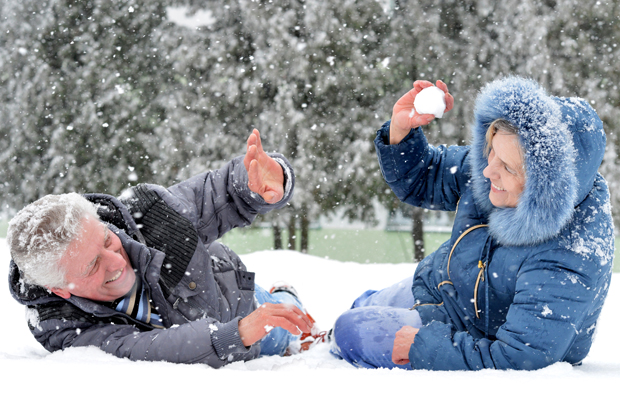
It may look like a winter wonderland when the snow falls, but the captivating seasonal landscape can be distracting and come with slips, trips and falls. Snowy and icy sidewalks, slushy intersections and limited visibility due to darker days increase the number of injuries each winter, especially hip and knee injuries.
Take Precautions to Avoid Slips, Trips, and Falls
As the old saying goes, an ounce of prevention is worth a pound of cure. Here are safeguards you can take to minimize your risk of falling:
- Wear footwear that is well-insulated, waterproof, has a non-slip, thick sole and a wide, low heel.
- Use handrails when available. Hold door frame or steering wheel for support when getting out of the car.
- Step down, not out. Step flatfooted off curbs, and don’t land heel first. Take short, slow steps.
- Beware of changes in walking surfaces. Many falls occur when someone doesn’t notice they are leaving a cleared area for a slippery one.
When safe practices aren’t enough and you feel yourself begin to fall, try to relax your body. When a falling person relaxes, injuries are less severe than when they are tense. Ice can further complicate matters. Fighting a fall on ice can cause twisting or bending injuries.
New Minimally Invasive Treatments Get Patients on the Road to Recovery Faster
Even when all precautions are taken, sometimes a fall is inevitable. The good news is that today’s treatments for the most common injuries — such as hip and knee injuries — are less invasive than in years past and help people become mobile quicker.
According to Dr. John Hoffman, an orthopedic surgeon at Orthopaedic Specialists in Davenport, Iowa, injuries that can’t be treated using rest, ice, or pain medication can often be handled on an outpatient basis.
“If an injury does require surgery, new technology and surgical techniques such as minimally invasive procedures are done on an outpatient basis so that people are a resting comfortably at home within a day,” said Dr. Hoffman. “These techniques decrease downtime for patients and allow them to get back to their lives faster.”
Dr. Hoffman performs many of these new minimally invasive procedures at the Mississippi Valley Surgery Center, a multi-specialty outpatient facility in Davenport, Iowa.
Hip Injuries
Falls can often lead to fractures of the hip. In fact, according to the Centers for Disease Control, there were approximately 258,000 hospital admissions for hip fractures among people 65 and older in 2010.
A hip fracture often requires surgical repair or replacement. By using a minimally invasive surgical approach, Dr. Hoffman is able to minimize the size of the incision and the amount of time it takes patients to recover from the surgery.
“Within hours of completion of the hip replacement surgery, patients are encouraged to get up and move around,” said Dr. Hoffman. “The formal therapy process begins once the patient is able to stand and walk from bedside to the bathroom and back with assistance from a nurse or physical therapist. Surgery Center patients go home in less than 24 hours with no hospital stay.”
Knee Injuries
Ligament injuries in the knee are also common after a winter-related fall. They typically vary in severity, and may include injury to multiple ligaments at the same time. In serious cases, the knee may become very unstable and require surgical repair. Dr. Tuvi Mendel is an orthopedic surgeon at Orthopeadic Specialists who specializes in minimally invasive knee surgeries.
“The minimally invasive surgeries we perform along with our customized physical therapy treatment plans allow our patients to experience faster pain relief, shorter recovery times, and minimal scarring,” said Dr. Mendel. The expert team at the Surgery Center creates an environment that helps us get patients back on their feet as soon as possible.”
If you’ve fallen and injured yourself, take the time to research different treatment options. A minimally invasive, outpatient approach can dramatically increase recovery time and get you back on your feet faster.
For more information about Orthopaedic Specialists, visit www.osquadcities.com. For more information about the Mississippi Valley Surgery Center, visit www.mvhealth.net or connect with them on Facebook at www.facebook.com/MississippiValleySurgeryCenter.

